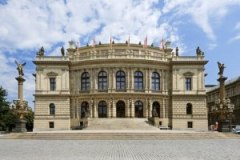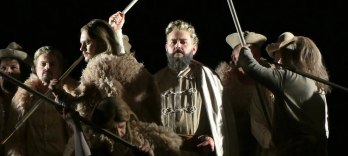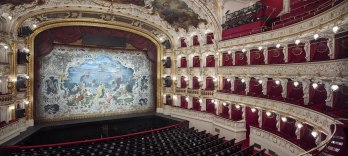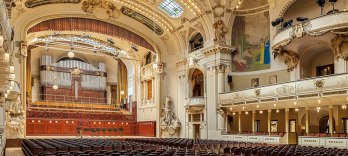Benjamin Bernheim
November 2024 | ||||||
|---|---|---|---|---|---|---|
Mo | Tu | We | Th | Fr | Sa | Su |
Benjamin Bernheim – tenor
Carrie-Ann Matheson – piano
We have decided that 2024 will be defined by tenor voices. After all, the sunny heroic tenor is a hallmark of every opera performance, he sings about love, suffers, and dies for it, too. Well, who wouldn’t adore beautiful tenor voices that flow on crystal clear cantilena over the audience, to bring on the catharsis of every operatic drama with a high manly tone!
The roster of star tenors that we intend to bring to Prague next year and that we have already written you about (Jonathan Tetelman, Jonas Kaufmann, Pene Pati) now completes with another fine artist, namely the French lyrical "crème de la crème" tenor Benjamin Bernheim, "the most beautiful tenor voice since Luciano Pavarotti“ (Süddeutsche Zeitung) "who sings Puccini like a dream." (BBC Music Magazine). Benjamin Bernheim will perform on 19th November 2024 in the Dvořák Hall of the Rudolfinum, and you should definitely not miss his recital.
The French tenor Benjamin Bernheim added another role to his Puccini repertoire in September 2023: he performed at the Zurich Opera House in the role of Ruggero in Puccini's La rondine alongside Ermonela Jaho, whom we introduced to you in a concert in April 2019. In recent seasons he has become a regular guest artist at leading European opera houses, including La Scala, Opéra national de Paris, Vienna State Opera, Berlin State Opera, Opéra national de Bordeaux, Royal Opera House in London, and Metropolitan Opera in New York. There, he performs in the main tenor roles of the romantic repertoire.
Benjamin Berhneim is also a highly regarded song interpreter. In August 2023, he performed in a highly acclaimed recital of French and German songs at the Salzburg Festival with and in the beginning of October, he was applauded by the sold-out La Scala, where he performed in a song recital with the pianist Carrie-Ann Matheson. He is also highly valued by audiences and critics as an actor who gives his all to his roles on stage. Benjamin himself says that when he enters the stage, he feels as if he is passing through a tunnel to another dimension, at the end of which he fully immerses into the character he portrays. That is also why he must fall in love and suffer for love 60 times a year, whether as Rodolfo in La bohème, Romeo, Le Chevalier des Grieux in Manon, Werther or Nemorino in L’elisir d’amore. Each time on stages of famous opera houses around the world. And finally, in the Rudolfinum in a year!
As in La Scala, Benjamin Bernheim will be accompanied in Dvořák Hall by Carrie-Ann Matheson, who is a frequent piano partner of many famous opera singers including Roland Villazón, Jonas Kaufmann, Piotr Beczała, Diana Damrau, Thomas Hampson, and Joyce DiDonato. As of January 2024, Carrie-Ann Matheson has been working as the Artistic Director of the San Francisco Opera Center and the Merola Opera Program.
Program and cast
Rudolfinum
The Rudolfinum, one of the most noteworthy buildings in Prague, was built between 1876 and 1884 according to the designs of architects Josef Zítek and Josef Schulze. Originally intended as a multipurpose cultural building in Prague, the Rudolfinum was inagurated on February 7, 1885. It carried out its mission until 1919, when it was converted to the House of Commons of the Czechoslovak Republic. Concert activity was restored to the Rudolfinum during the German occupation, but full rehabilitation, particularly of the gallery, did not take place until 1992. After a general reconstruction by architect Karel Prager in 1992, the Rudolfinum became the home of the Czech Philharmonic and the Rudolfinum Gallery.
Dvorana – Ceremony Hall
The central space in the gallery portion of the Rudolfinum was designed by Josef Zítek and Josef Schulz as an entrance hall to the art gallery. After 1918, however, this space was converted into a parliamentary cafeteria, and after World War II it served as a gymnasium for the Prague Conservatory. At the end of the 1980s, Ceremony Hall was threatened with reconstruction – but plans to tear down the main staircase to make room for another concert hall did not go through, and the hall retained its original appearance. Of particular interest in Ceremony Hall are 25 empty spaces on its walls, which were originally intended to be filled in with frescos. The majority of the eminent Czech painters, however, boycotted the 1891 fresco competition in protest over the large number of German artists involved in the construction of the Rudolfinum.
 Dvořák Hall
Dvořák Hall
The Czech Philharmonic took the stage in this world-famous concert hall in 1896, performing for its first-ever concert under the baton of Antonín Dvořák himself. The hall remained a space for concerts and performances until 1918, at which time it became a boardroom for the new parliament of the Czechoslovak Republic. The stage and the organ loft became a tribunal (garnished with a statue of President T.G. Masaryk), from which parliamentary leaders presided over proceedings. The hall's original character (and purpose) was restored
in 1940–1942 according to a project conceived by Antonín Engel and Bohumír Kozák, and it has remained in this form through to the present. In accordance with Josef Zítek and Josef Schulz's original proposal, the central visual element in the hall is an organ, which was made in Frankfurt, Germany. During the hall's stint as a parliamentary meeting place, the organ was housed in Brno. When it returned to the Rudolfinum in 1940, its register was extended. Dvořák Hall's final update took place in 1992 when the entire Rudolfinum building underwent reconstruction.
When travelling by public transport, get off at the Staroměstská metro station (Line A), tram stop (trams nos. 17, 18 and 53) or bus stop (no. 207).
Parking is available at the underground parking facility on Jan Palach Square. The facility is not part of the Rudolfinum premises.
Performances: Mo 28 Oct 2024,
Performances: Th 26 Sep 2024,
Performances: Mo 09 Sep 2024,
Performances: Sa 07 Dec 2024,
Performances: We 29 Jan 2025,
Performances: Th 28 Nov 2024,

 EN
EN DE
DE IT
IT FR
FR ES
ES RU
RU JP
JP RO
RO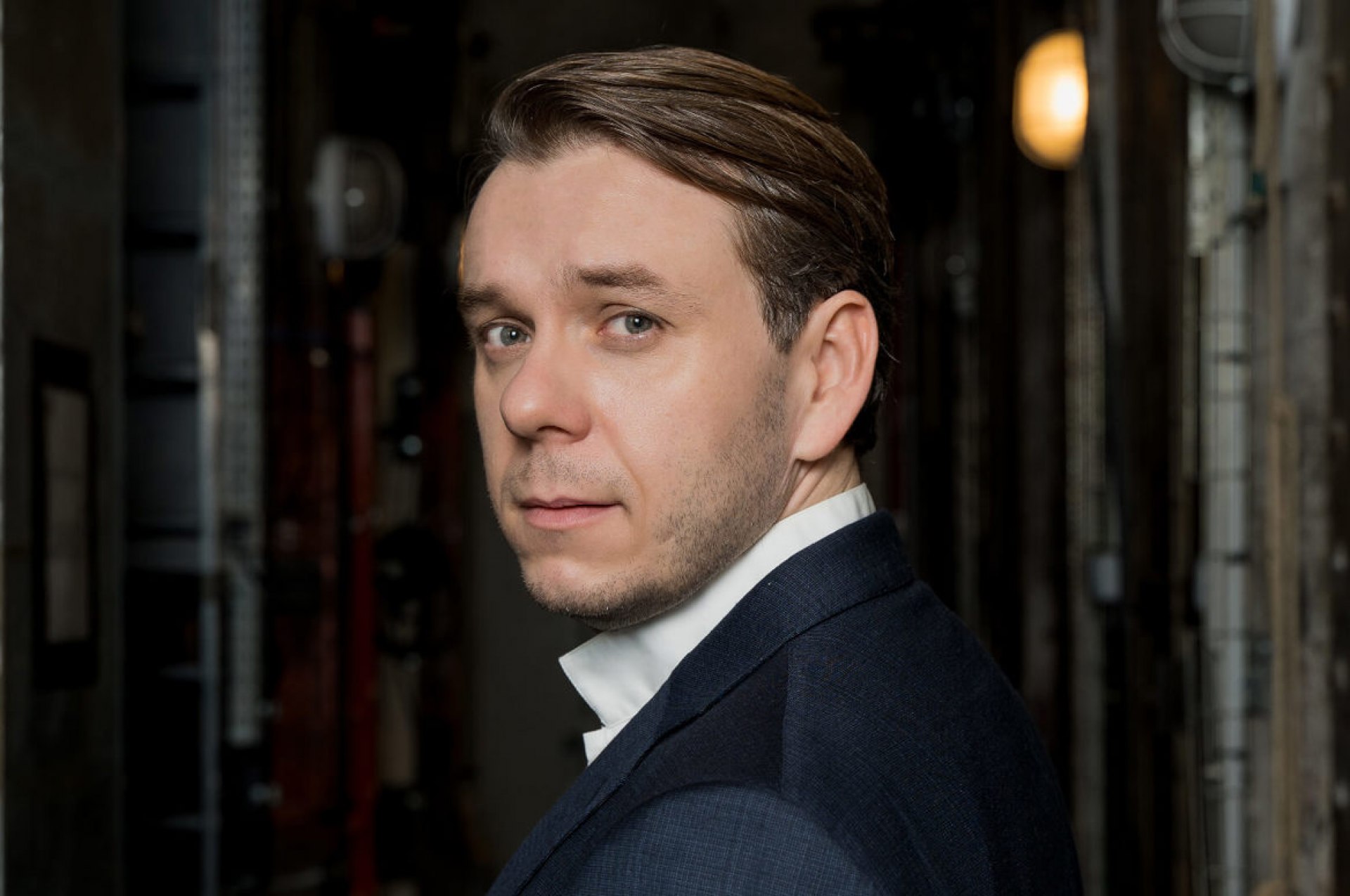
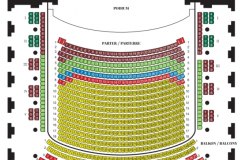 Seating plan
Seating plan 